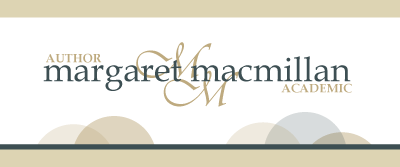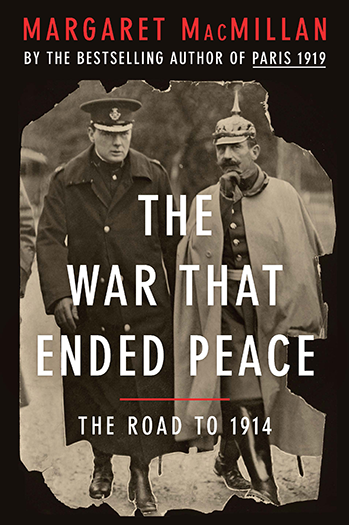Reviews: The War that Ended Peace


“One of the strengths of The War That Ended Peace is MacMillan’s ability to evoke the world at the beginning of the 20th century … MacMillan’s portraits of the men who took Europe to war are superb … The logic of MacMillan’s argument is such that even now, as she leads us day by day, hour by hour through the aftermath of the assassination of Archduke Franz Ferdinand in Sarajevo on June 28, 1914, we expect some statesman or other to jump on the lighted fuse … ‘There are always choices,’ MacMillan keeps reminding us.”
The New York Times Book Review (Editor’s Choice)
“Masterly … Marvelous … Historians have long argued about why the war started and whether it could have been avoided … Margaret MacMillan’s new book The War That Ended Peace: The Road to 1914 will be a welcome addition to these debates … She takes a long look and examines the many forces that had been moving Europe in the direction of a war for a quarter century … MacMillan is a master of narrative detail and the telling anecdote and this makes for a lively read. She does not break new ground in this book as much as present an exceptionally complex story in a way that will appeal to the general reader. … Those looking to understand why World War I happened will have a hard time finding a better place to start.”
Christian Science Monitor
Magisterial...rich and suggestive... MacMillan is a wry and humane chronicler of this troubled world... lively and sophisticated... as MacMillan observes in a closing sentence that is well worth taking to heart, 'there are always choices'
Christopher Clark, London Review of Books
Splendidly well written - fluent, engaging, well-paced and, despite the grim subject, often entertaining
Richard Overy, New Statesman
The Canadian historian laces The War That Ended Peace with deft character sketches and uses sources incisively...MacMillan escorts the reader skilfully through the military, diplomatic and political crises that framed the road to war from 1870 to 1914.
Tony Barber, FT
She writes prose like an Audi - purring smoothly along the diplomatic highway, accelerating effortlessly as she goes the distance. This is a ground-breaking book, decisively shifting the debate away from the hoary old question of Germany's war guilt. MacMillan's history is magisterial - dense, balanced and humane. The story of Europe's diplomatic meltdown has never been better told.
Jane Ridley, Spectator
The question of the causes of the Great War has occupied historians for decades and promises to continue to intrigue. MacMillan (history, Univ. of Toronto), prize winner for Paris 1919, reviews the dynamic tensions in Europe prior to 1914. She reminds readers that the leaders of several European nations were dealing with such issues as fears of revolution at home and abroad while maneuvering for an advantage in the military sphere. The series of crises in the Balkans may have convinced political and military minds that any impending conflict would be of short duration. So, as MacMillan notes, the war was perceived as one that would have almost a cleansing effect on the European world. It turned out much differently. This book adds to a growing corpus exploring the war's roots.
Verdict: This is a first-rate study, necessary for all World War 1 collections. Highly recommended.
Ed Goedeken, (EG) Iowa State University Lib., Ames
“Margaret MacMillan, the author of Peacemakers , which won numerous prizes, is that wonderful combination — an academic and scholar who writes well, with a marvellous clarity of thought. Her pen portraits of the chief players are both enjoyable and illuminating. Among the cascade of books arriving for the anniversary, this work truly stands out.”
Antony Beevor, Times
“ [An] excellent, elegantly written book...as fine an assessment of the reason peace failed as any yet written”
Saul David, Evening Standard
“A sweeping but immensely readable account…an impressive feat"
Bronwen Maddox, Prospect
“Few historians have better credentials to write about the origins of the First World War than the Oxford scholar Margaret MacMillan…with its lovely elegant style, keen eye for human foibles and impeccable attention to detail, this is one of the most enjoyably readable books of the year”
Dominic Sandbrook, Sunday Times
“MacMillan’s superb and very entertainingly written guide to this Europe – a Europe, as she shows, similar to our own in some ways, but very different in others – will be warmly welcomed by different kinds of reader. Those who “know” the subject will find new perspectives and new ways of looking at it, while those less familiar with it could hardly find a better introduction or a better basis for judging some of the centenary polemics we now face.”
Roger Morgan, Times Higher Education
“Magnificent…The War That Ended Peace will certainly rank among the best books of the centennial crop...[MacMillan] deftly navigates the roiling currents and counter-currents of the pre-war decades … The Great War had a kaleidoscope of causes. Ms MacMillan tackles them all, with a blend of detail and sweeping observation.”
The Economist - click here for more information.
“A first-rate study, necessary for all World War I collections. Highly recommended.”
Library Journal (starred review)
“Everything can be lent a veneer of inevitability, but history rarely works in such a linear manner. But MacMillan, famous for her scholarship on the peace concluding WWI, avoids this trap. She shows, again and again, that events could have run in any number of different directions.”
Booklist
Thorough … lively … Exhaustive in its coverage of diplomatic maneuvering and the internal political considerations of the various nations, the book includes comprehensive discussions of such motivating issues as Germany's fears of being surrounded, Austria-Hungary's fears of falling apart and Russia's humiliation after losing a war with Japan.”
Kirkus
“Brilliant…the author is not merely a fine scholar…but she is also terrifically sensible, a rare combination”
Mail on Sunday Books of the Year – chosen by Max Hastings
“magisterial”
Economist Intelligent Life
“magnificent”
Tablet Books of the Year
"The War That Ended Peace: The Road to 1914'' by Margaret MacMillan: I am only halfway through the book and I don't want to put it down, but occasionally I must if I am to earn a living. On the other hand, when I finish it, I will regret having done so because what I will really want to do is read it again for the first time."
Paul Martin, former prime minister of Canada - Bloomberg
The War that Ended Peace
Advance Praise....
“[A] richly textured narrative about World War I . . . addressing the war’s build-up . . . [Margaret] MacMillan tells this familiar story with panache. A major contribution, however, is her presentation of its subtext, as Europe’s claims to be the world’s most advanced civilization ‘were being challenged from without and undermined from within.’ . . . MacMillan eloquently shows that ‘turning out the lights’ was not inevitable, but a consequence of years of decisions and reactions: a slow-motion train wreck few wanted but none could avoid.”
Publishers Weekly (starred review)
“The War That Ended Peace tells the story of how intelligent, well-meaning leaders guided their nations into catastrophe. These epic events, brilliantly described by one of our era’s most talented historians, warn of the dangers that arise when we fail to anticipate the consequences of our actions. This is one of the finest books I have ever read on the causes of World War I.”
Madeleine Albright, former secretary of state
“You know the story, and how it ended so horrifically in August 1914. Yet, with sure deftness, Margaret MacMillan manages to combine excellent history with elements of the cliff-hanger. You keep hoping that, at the last moment, one of those idiot leaders of 1914 might see the light, and blink, before it was too late. With the knowledge displayed in her prize-winning Paris 1919, no one is better equipped to recount this story than Margaret MacMillan.”
Sir Alistair Horne, author of The Price of Glory: Verdun 1916 and A Savage War of Peace: Algeria 1954-1962
“In this epic tale of human folly, Margaret MacMillan brilliantly explores the minds of the flawed, fascinating men whose misguided decisions led to a conflagration that few wanted or believed would actually happen. Her masterful account of how the unthinkable became reality makes clear that World War I might have been avoided if just one or two leading figures had been courageous enough to withstand the incessant drumbeat of war. A must-read book for our time.”
Lynne Olson, author of Those Angry Days and Citizens of London
“Once again, Margaret MacMillan proves herself not just a masterly historian but a brilliant storyteller. She brings to life the personalities whose decisions, rivalries, ambitions, and fantasies led Europe to ‘lay waste to itself’ and triggered decades of global conflict. Hers is a cautionary tale of follies a century in the past that seem all too familiar today.”
Strobe Talbott, president, Brookings Institution
“The War That Ended Peace is a masterly explanation of the complex forces that brought the Edwardian world crashing down. Utterly riveting, deeply moving, and impeccably researched, Margaret MacMillan’s latest opus will become the definitive account of old Europe’s final years.”
Amanda Foreman, author of A World on Fire
After asking for her autograph, the first thing I would do if I ever met British historian Margaret MacMillan would be to ask her if she ever wonders whether peace is merely an interlude between the seemingly inevitable cycle of wars that mankind visits on itself.
A cynical question, perhaps, but an unavoidable one, especially after reading this authoritative, engaging chronicle of how after a palmy, self-assured century of relative peace, Europe’s monarchies first and then the rest of the world were plunged into an orgy of mechanized carnage that horrifies even now, 99 years later. It is also a timely question because so many of the mindsets, instabilities and perceived threats that drove a tiny elite have such disturbing parallels in today’s global arena. Now, as then, world leaders say they want peace even as they go about preparing for the next war.
James Strodes - Special to the Washington Times

Media Coverage
Simon Sebag Montefiore has picked The War that Ended Peace as one of his books of the year in the Evening Standard: “I’m reading Margaret Macmillan’s majestic, masterly portrait of the road to cataclysm The War That Ended Peace”
View article here.
"Margaret MacMillan complements Peacemakers, her brilliant account of Paris in the peace negotiations of 1919 with The War That Ended Peace"
Robert Fox, The Oldie. View article here.
"Margaret MacMillan's judgement in The War That Ended Peace is more balanced
The Times Literary Supplement. View artcile here.
MacMillan’s new book, The War that Ended Peace: The Road to 1914, charts the “years and circumstances leading up to” the First World War — which, MacMillan argues, could have been avoided up to the last moment.
Macleans. View article here
The War that Ended Peace is a Sunday Times Book of the Year: “thoughtful, moving and smoothly written”.
The Sunday Times. View article here
The War That Ended Peace is one of the Economists Books of the Year
Reviews of Paris 1919
“The history of the 1919 Paris peace talks following World War I is a blueprint of the political and social upheavals bedeviling the planet now. . . . A wealth of colorful detail and a concentration on the strange characters many of these statesmen were keep [MacMillan’s] narrative lively.”
The New York Times Book Review (Editors’ Choice)
“Beautifully written, full of judgment and wisdom, Paris 1919 is a pleasure to read and vibrates with the passions of the early twentieth century and of ours.”
San Francisco Chronicle
“For anyone interested in knowing how historic mistakes can morph into later historic problems, this brilliant book is a must-read.”
Chicago Tribune

Site Design: Steep Hill Productions